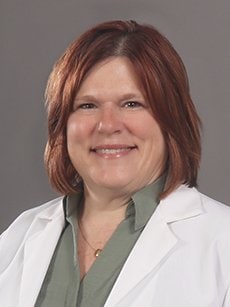Breast Health and Breast Cancer Prevention
Article written by Jill Dunham, NP, at Bronson Oncology and Hematology Specialists

Good breast health begins with being aware of your breasts and knowing your risk of breast cancer. According to the World Health Organization, breast cancer is the most common form of cancer worldwide. 1 in 8 women will develop it in their lifetime. Knowing your risk helps create personalized screening and prevention plans, leading to earlier detection and better outcomes if diagnosed with breast cancer.
Knowing the facts about breast cancer, being aware of the signs and symptoms, and understanding the need for screening are key to making informed decisions about your breast health.
Risk Factors
Several factors may increase your risk of developing breast cancer. They include:
- Being born female
- Age
- Having a family history of breast cancer
- Having dense breast tissue
- Starting menstruation before age 12 or going through menopause after age 55
- Having a history of abnormal or atypical cells in breast biopsies
- Receiving radiation treatment to the chest during childhood or teenage years
Certain lifestyle factors can also increase your risk, such as drinking alcohol, being overweight, not exercising, not having children, not breastfeeding or using some types of hormone therapy.
Screening Options
Routine self-examination and screening with mammography have been proven to reduce the risk of death from breast cancer.
The National Comprehensive Cancer Network (NCCN) recommends all women 25 years and older have an awareness of the normal look and feel of their breasts and understand their personal risks, including family history. Those at average risk should begin annual screening mammograms at the age of 40, along with a clinical breast exam by their primary care or OB/GYN provider. Those found to be at an elevated risk may be candidates for more frequent screening, as well as risk reducing options.
Prevention and Risk Reduction
Many studies have shown that there are proactive measures to lower the risk of developing breast cancer, as well as improve overall health:
- Regular exercise, with a goal of 150 minutes per week
- Eating a healthy diet including vegetables, fruits and whole grains, while also decreasing intake of red meat, saturated fats and
- processed foods
- Maintaining a healthy body weight and avoiding obesity
- Avoiding alcohol consumption
- Managing stress
- Getting enough sleep
If you are concerned about your breast cancer risk, talk with your primary care provider or gynecologist. They may consider referring you to Bronson’s High Risk Breast Clinic for a comprehensive risk assessment.
Bronson’s High Risk Breast Clinic
Patients identified as high risk for developing breast cancer can receive long-term care through our High Risk Breast Clinic. Services and support include early detection screenings, clinical breast exams, genetic counseling referrals and ongoing monitoring to reduce overall risk.
The clinic is a collaboration between Bronson’s surgery, radiology and oncology teams. This multidisciplinary team is dedicated to identifying and managing individuals in the community who have been found to have an increased lifetime risk of developing breast cancer.
Exceptional Cancer Care
If you receive a cancer diagnosis, trust southwest Michigan’s most preferred healthcare system. Bronson Cancer Center – with locations in Battle Creek and Kalamazoo - offers a comprehensive approach to care that surrounds patients with the expertise, technology, resources and positivity needed at every stage of the cancer journey. Learn more about Bronson's regional cancer program.